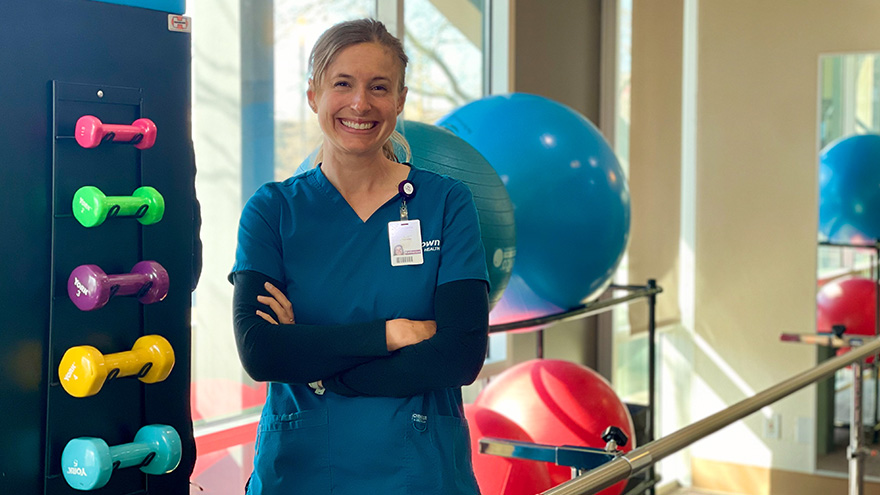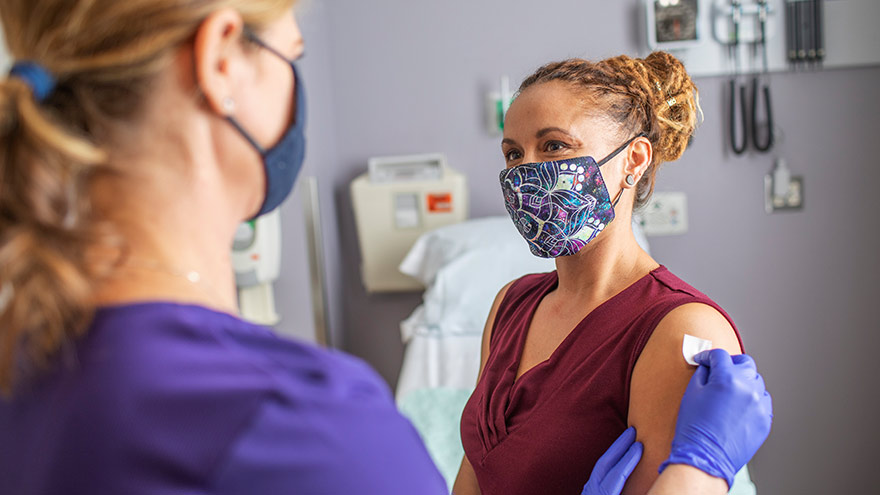Search
Results for 'primary care'
Clear-
Faculty - Family Medicine Residency
Full Time - Eligible for Benefits510701 AdministrationVaries -
Take a Stand Against Domestic Violence
October is Domestic Violence Awareness Month in the United States. We spoke with Renown Health experts and local domestic violence prevention organizations who gave us a deeper look into understanding the warning signs of abuse and the many proactive and reactive resources in our community that you can reach out to today. Domestic violence, also referred to as domestic abuse, is an everyone issue. Whether you identify as male or female, an adult or a child, single or partnered – domestic violence can affect anyone. In fact, it may be closer to home than you might think. According to the Nevada Quality Parenting Initiative, in Nevada, 43.8% of women and 32.8% of men experience domestic violence in their lifetime, and the risk of that figure rising is imminent. This year alone, the Domestic Violence Resource Center (DVRC) in Reno experienced a 55% increase in overnight emergency stays, according to the Reno Gazette-Journal. This problem also, unfortunately, extends to children. More than 5,000 children in Nevada were reportedly primary or secondary victims of domestic abuse in 2021, as stated by the Nevada Coalition to End Domestic and Sexual Violence. “Domestic violence can manifest in many different ways,” said Kami Price, Supervisor of Social Services for Renown Health. “Abuse isn’t always strictly physical. It can also be emotional, verbal, sexual and even digital. Understanding those differences can help you prepare accordingly and respond safely if you or a loved one are experiencing domestic violence.” Knowing what to look out for is crucial in protecting yourself and others against the effects of domestic abuse and taking action when warning signs appear. The National Domestic Violence Hotline shares the common signs of an abusive partner, no matter how old they are or what gender they identify as: Telling you that you never do anything right. Showing extreme jealousy of your friends or time spent away from them. Preventing or discouraging you from spending time with friends, family members or peers. Insulting, demeaning or shaming you, especially in front of other people. Preventing you from making your own decisions, including about working or attending school. Controlling finances, including taking your money or withholding money for needed expenses. Pressuring you to perform sexual acts you’re not comfortable with. Pressuring you to use drugs or alcohol. Intimidating you through threatening looks or actions. Threatening to harm or take away your children or pets. Intimidating you with weapons. Destroying your belongings or your home. "People experiencing domestic violence may feel as though they are trapped,” said Kami Price. “The reality is – this often couldn’t be further from the truth, especially with the resources we have at our disposal in northern Nevada.” Respected Resources Ending the Silence on Domestic Violence While these facts and figures might be staggering, those experiencing domestic violence at any age are not alone. There is hope at the end of the tunnel, especially here locally. Devoted to meeting the growing needs of the communities we serve, Renown Health proudly supports and sponsors several organizations in our community that are committed to educating children and adults on the signs and symptoms of domestic violence, along with what each child and family member can do today to prevent abuse in the household. These essential organizations are on the frontlines of shifting attitudes from “I don’t want to get involved” to “How can I help?” Serving children across northern Nevada, the Child Assault Prevention (CAP) Project offers “education and prevention programs designed to increase children’s safety from bullying, abuse and assault” and break the cycle of domestic abuse. During 2021 and the first half of 2022, CAP led about 500 different workshops, teaching 10,000 second-grade and fourth-grade children in Washoe, Storey, Lyon and Churchill Counties how to keep themselves safe from domestic violence. “As domestic violence is on the rise, open communication, early intervention and education are key to protecting children from the effects of domestic violence," said Rebecca LeBeau, Executive Director of the CAP Project. “That’s why I begin speaking about child assault prevention and stranger danger to kids as young as six years old. It's important to explain the true reality of domestic violence to both children and adults, tailoring language specifically to whatever age they are, and allowing them to process it. Kids of all ages will learn how to deal with extremely dangerous situations this way.” According to Rebecca, common symptoms of abuse to be on the lookout for at school include grades dropping, a lack of focus and feelings of not wanting to return home after the school day ends. If someone in a child’s home is being hurt or abused, children are always encouraged to speak with a trusted adult or school counselor. From there, organizations like the CAP Project develop a safety plan moving forward. Adults and family units aren’t alone either. The DVRC provides a wide variety of services to Washoe County residents experiencing domestic abuse. To date, the DVRC has helped more than 100,000 victims of domestic violence, and with the recent launch of their crisis text line, they are poised to serve many more. Like the CAP Project, the DVRC also believes that education is one of the first lines of defense against domestic violence. “Education on what domestic violence looks like is so much more than talking about physical violence,” said Aria Overli, Volunteer Coordinator at the DVRC. “Educating the community, and particularly youth, about what healthy relationships look like is a major factor in preventing abuse. Understanding the intersection of how other issues – such as race, mental illness and immigration status – affect domestic violence risk factors is key to addressing those issues.” The list doesn’t stop there. Renown Health Foundation has provided financial support for many more organizations that are dedicated to ending the silence on domestic violence, sexual violence and family abuse, including: The Children’s Cabinet – A child-focused organization offering many support services for youths and families, including Safe Place, a program that partners with local businesses to offer safe locations for children to seek help if they feel threatened at school or at home. The organization also provides free family counseling, providing a pathway to better communication for families experiencing a myriad of issues ranging from domestic violence to substance abuse. Awaken – A nonprofit committed to increasing awareness and education regarding sex trafficking and providing housing and healing to all survivors. Safe Embrace – The largest and most inclusive safe house in Reno-Sparks for survivors of domestic and sexual violence, offering a wide range of resources including counseling, emergency transportation, court support and more. Eddy House – A safe space for at-risk individuals aged 18-24 recovering from the effects of domestic abuse, unsafe housing conditions, homelessness and more. Being an advocate starts with us – if you see something, say something. Keeping a transparent line of communication is key to preventing, noticing and combating domestic violence. “The more you reach out and talk about the issues, the better,” closed Kami Price. “No one has to go through their struggles alone.”
-
Enterprise Project Manager
Full Time - Eligible for Benefits100754 Performance ExcellenceDay -
Recognizing World Lymphedema Day
To recognize World Lymphedema Day, Katherine Bunker, Physical Therapist and Certified Lymphedema Therapist (PT, DPT, CLT) at Renown, shares her experience helping those with lymphedema and lymphatic disease thrive in their daily lives. Each year, World Lymphedema Day continues to be an advocate-driven celebration and global education opportunity on what it means to live with lymphedema and lymphatic disease. We explore why this cause deserves global recognition each year on March 6 below. Types of Lymphedema Lymphedema is an abnormal collection of protein-rich fluid that causes swelling just beneath the skin. The fluid, which is filtered through the lymph nodes, makes up a network of tissues that help the body get rid of toxins, waste and other unwanted substances. According to Katherine Bunker, PT, DPT, CLT at Renown Health, this collection of fluid causes swelling, usually in the arms or legs, but can happen in other areas too. It can also cause discomfort, restricted movement and may increase the risk of infections.
-
Pharmacy Quality Assurance
Full Time - Eligible for Benefits200211 PharmacyDay -
CT Scan Technologist_Inpatient
Sign On Bonus - $10,000Full Time - Eligible for Benefits200253 Comp Tomographic ScanDay -
Hospitalist Administrative Director
Full Time - Eligible for Benefits530706 Administration Dept of MedicineDay -
Type 2 Diabetes: What You Should Know
Type 2 diabetes, formerly known as adult-onset diabetes, is on the rise for adults and children in the United States. Although genetics play a role, you can take steps today to lower your risk of developing this life-altering condition. Michael Raymund Gonzales, MD with Renown Endocrinology answered our questions about Type 2 diabetes and gave us some useful tips for prevention. What effect does diabetes have on the body? And who’s most at risk? First, it’s important to know the difference between the two most common types of diabetes: Type 1 diabetes is the result of the body’s inability to make insulin, which is a hormone your body needs to be able to use sugar, or glucose, for energy. Type 1 is not preventable, and people who have it were either born with it or they developed it later in life due to an autoimmune process that attacked the pancreas that went unrecognized. Type 2 diabetes occurs when the body makes the insulin hormone, but it might not make enough or work well enough for the body to use sugar for energy. This is called insulin resistance. This condition usually develops later in life but is preventable with proper diet, exercise and weight loss. However, due to the obesity epidemic, type 2 diabetes is occurring more often in younger individuals. Diabetes hurts the body’s ability to break down glucose, so rather than it being used for energy, glucose stays in the bloodstream, which can cause problems. But with early detection and the help of your doctor, diabetes can be managed so that complications are avoided. Left unmanaged, however, diabetes can affect major organs and lead to heart and blood vessel disease, nerve damage, kidney damage, eye damage, skin conditions and more. Type 2 diabetes also results from risk factors that you can’t control, including your family history, race and age. However, there are a few risk factors that you can watch out for, such as being overweight, inactivity, diet choices, having high blood pressure and high cholesterol and triglycerides.
-
Slow the Spread of the Flu with Herd Immunity
As the leaves turn golden and the air gets crisper, it's not just pumpkin spice lattes that should be on your mind – it's also time to think about your health. Fall time also means it’s flu season and with new cases on the rise, we at Renown Health encourage you to do your part in keeping your Fall activities community safe. How can you protect your whole community you ask? Through something called Herd Immunity. We spoke with Renown Health infection prevention expert, Susanne James to talk about how getting your flu shot is vital for staying healthy and protecting your families and community.
Read More About Slow the Spread of the Flu with Herd Immunity




